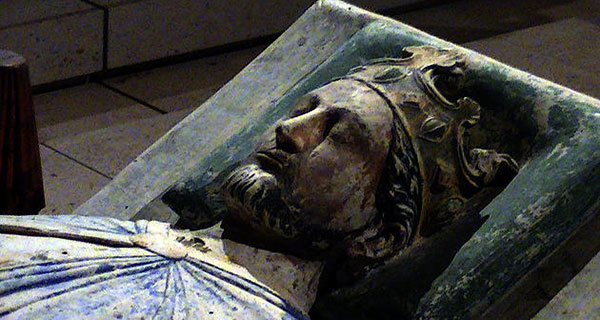 England’s most famous medieval monarch, Richard the Lionheart, died 820 years ago this April. Wounded while besieging a castle in western France, he succumbed to gangrene.
England’s most famous medieval monarch, Richard the Lionheart, died 820 years ago this April. Wounded while besieging a castle in western France, he succumbed to gangrene.
Strangely, though, despite his being the most famous European warrior of his time, one of the major modern talking points about him pertains to his sexuality. Specifically, was he gay?
Although born in England, Richard (1157 to 1199) was ethnically and culturally French. His father’s initial power base was in Anjou and Normandy, and his mother was the heiress to Aquitaine. With England subsequently added to this portfolio of possessions, the family’s dominions ranged from the Scottish border to the Pyrenees, including large chunks of modern France.
But other than as a source of revenue, Richard was never much interested in England. And when – in the medieval royal fashion – his body was subdivided following his death, the three chosen burial locations were all in France. In the words of historian Jean Flori, “King of England and emblematic image in his country, Richard was in no way an English king.”
Still, thanks to his heroic profile during his lifetime, his association with the Robin Hood tales and his depiction in popular fiction, Richard’s image became a potent part of the English imagination. A giant equestrian bronze statue showing him ready for battle has stood outside the Palace of Westminster since 1860.
My first acquaintance with the gay Richard meme came in 1968, courtesy of a young English nurse from the medical centre at the company where I worked. She’d just seen The Lion in Winter and was distressed by the movie’s unflattering portrait of a homosexual Richard. This wasn’t the image she’d grown up with, so she was looking for reassurance that it was false. But never having heard of it, I couldn’t help.
In fact, it was John Harvey’s 1948 book The Plantagenets that first introduced the question of Richard’s sexuality into English-language historiography. A number of historians have since accepted the premise while others are skeptical.
Professor John Gillingham falls into the latter category. With several decades of writing about Richard under his belt, Gillingham’s bottom line is that the inferences regarding sexuality are speculative: “We simply do not know.”
The evidence advanced for the gay thesis centres around three main points:
First, Richard refused to marry Alice, the French princess to whom he was long betrothed. However, given that Alice had probably done duty as his father’s mistress – perhaps even bearing a son in the process – Richard’s refusal doesn’t seem unusual. And he did subsequently marry Berengaria of Navarre.
Second, there are the references to him sharing a bed with Philip of France. But as Gillingham points out, in the 12th century such gestures didn’t necessarily have an erotic component. They could just as easily be seen as an expression of a political alliance. To quote: “It is an elementary mistake to assume that an act which has one symbolic meaning for us today possessed that same meaning 800 years ago.”
And third, there’s the hermit’s 1195 warning that Richard needed to “abstain from illicit acts” lest he fall prey to the same fate as the denizens of Sodom and Gomorrah. Illicit acts, however, can cover a pretty wide stretch of territory, including adultery.
Flori examines the same evidence as Gillingham and tends towards many of the same conclusions. But he ascribes more weight to the Sodom and Gomorrah angle. Putting it in biblical context, he believes it “highly probable, if not certain” that the reference is to homosexual behaviour.
That said, Flori declines to characterize Richard as exclusively or even predominantly gay. Noting his contemporary reputation as a voracious consumer of women and his acknowledgement of an illegitimate son, Flori sees him as “above all a hedonist,” “probably bisexual” and “a versatile lecher.”
While an historical figure’s sexuality is certainly a valid consideration for a fully rounded biography, the focus in Richard’s case is perhaps a reflection of our modern obsessions. There are far more interesting things to speculate about.
For instance, if he were alive today, where would he stand on Brexit?
French to the core, I believe he’d be a Remainer rather than a Brexiteer. Mind you, he’d also expect to be running the whole shebang as emperor of Europe.
Troy Media columnist Pat Murphy casts a history buff’s eye at the goings-on in our world. Never cynical – well, perhaps just a little bit.
The views, opinions and positions expressed by columnists and contributors are the author’s alone. They do not inherently or expressly reflect the views, opinions and/or positions of our publication.

